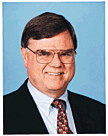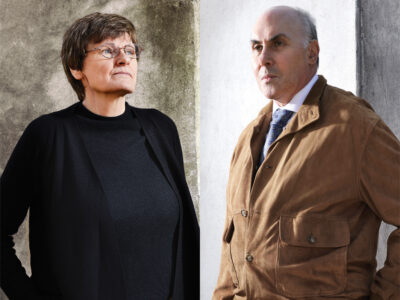
Dr. William N. Kelley was dismissed as CEO of the University’s Health System (UPHS) and Medical Center and dean of the School of Medicine on Feb. 17. Taking over those positions on an interim basis is Dr. Peter G. Traber, the Frank Wister Thomas Professor of Medicine and chair of the department. Kelley, who will remain a tenured member of the faculty in the Department of Medicine, with a secondary appointment in biochemistry and biophysics, has been asked to play a “vital and expanded role in the increasingly complex and volatile realm of national health-care policy” as executive vice president of health affairs. But as the Gazette went to press, Kelley was still, in the words of a Penn press release, “considering this important new assignment.”
Kelley, who came to Penn from the University of Michigan in 1989 as dean of the medical school and executive vice president of the Medical Center, oversaw the creation of the Health System in 1993 and became its first CEO. He is widely credited with boosting the academic reputation of the medical school and the Medical Center, and by 1994 the Health System had posted a $123 million profit. But changes in the national infrastructure of health-care reimbursement—as well as an aggressive program of bidding for physicians’ services and constructing and buying health-care facilities—led to operating losses of almost $300 million over the last two fiscal years, out of an operating budget of some $1.9 billion. The Health System recently eliminated 2,800 positions—roughly 20 percent of its workforce [“Gazetteer,” July/August, January/February]—though by then its financial troubles had caused not only its own bond rating to fall but also the University’s.
This past fall, Kelley told the Gazette that because of the layoffs and other cost-cutting measures, the Health System was in the black for the first quarter of the fiscal year, and had a “hell of a good shot at being better than break-even this year, and for sure next year.”
The day he took over, Traber was asked if the budget was indeed in the black. “It is,” he replied. “The indicators remain good, but everyone worries about the second half of fiscal years, so we continue to have the same level of concern that Bill had to keep us on the course.” But, he added: “There’s no dramatic changes that led to this decision or anything else.” The real challenge is to “understand the finances in great detail,” he said. “I think we do already, but we have to galvanize the faculty and staff in certain key areas to sustain our financial recovery.”
Traber stressed that he was “very respectful and admiring of what Bill Kelley has done over the past 10 years,” adding: “I think he’s served as few deans ever have, either here at Penn or any other school, and he’s clearly one of the great medical leaders of the last quarter-century. So I don’t want his achievements to be diminished.”
“Academic medical centers like ours face enormous financial challenges today,” said Penn President Judith Rodin in a statement issued Feb. 17, the day Kelley was ousted. “This is not a time of expansion. Rather, it is a time requiring integration, tight fiscal management and a highly strategic focus on investments.”
In a farewell e-mail to the Health System’s trustees, faculty, staff and medical-school students, Kelley wrote: “While we are on the right track in solving our financial problems, the crisis is by no means over. The changes we have made will go far toward making UPHS a stronger, leaner institution.
“As you can imagine, I am disappointed not to be able to see my long-term plans to full implementation,” Kelley added, “but nonetheless, we accomplished a great deal together.” He pointed to the fact that Penn was again ranked second among the nation’s medical schools
in funding from the National Institutes of Health, and said he was particularly proud of “leading Penn Med during its spectacular and unparalleled rise as a favorite of the NIH.” He also noted that U.S. News & World Report had ranked the medical school third in the nation, and that “despite our economic constraints,” the Hospital of the University of Pennsylvania was ranked 10th in the nation and was listed on the magazine’s “Honor Roll.”
Traber, a gastroenterologist who came to Penn in 1992 from the University of Michigan, was described by Rodin as an “exceptional researcher and clinician whose knowledge of UPHS is broad and deep.” While a search for “permanent leadership” will soon begin, Traber will be assisted by Dr. Arthur K. Asbury, the Van Meter Emeritus Professor of Neurology, who becomes the school’s deputy dean. Asbury, a member of the faculty since 1974, had served as the school’s senior vice dean and acting dean as well as acting executive vice president of the Medical Center. In addition, Dr. Robert D. Martin, the Health System’s chief operating officer, will stay on, while Dr. David Hunter, president and CEO of the Hunter Group (which has served as consultants to the Health System) will provide “regular advice and consultation as UPHS goes about the hard job of comprehensive financial remediation,” according to an e-mailed message from Rodin and James S. Riepe W’65 WG’67, chairman of Penn’s board of trustees. They added that the new team’s assignment is to “continue the momentum of the last decade that has brought UPHS to the top tier of academic medical centers.”
Traber said that his “immediate goal” is to “stabilize the faculty and staff’s uncertainty that occurs when there are changes,” adding: “The biggest resource that we have by far is a fabulous faculty, and I’m going to spend a lot of effort reassuring them that our mission and core values are going to drive what we do here.
“I’ve been doing this for a day now, so I’ve got a lot of homework to do,” acknowledged Traber, who said that his new appointment came as a surprise to him. “Suffice it to say I didn’t start my week thinking this would happen.”




